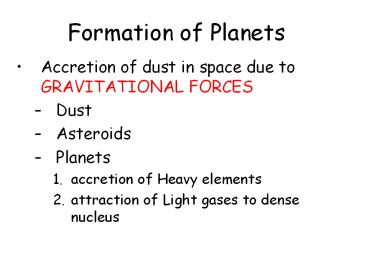Formation of Planets PowerPoint PPT Presentation
Title: Formation of Planets
1
Formation of Planets
- Accretion of dust in space due to GRAVITATIONAL
FORCES - Dust
- Asteroids
- Planets
- accretion of Heavy elements
- attraction of Light gases to dense nucleus
2
Origin Solar System
3
Formation of Planets
- Recent planets were HOT
- Compressional Heating
- Impact Heating
- Radioactive Decay
- The Earth is layered by Densities
- Densest Core
- Lightest Crust
4
(No Transcript)
5
Earths Layers
- Core (Fe, Ni)
- Inner Core (solid)
- Outer Core (liquid)
- Mantle (plastic) very close to melting point
- Inner Mantle
- Asthenosphere
- Lithosphere (rigid)
- Upper Mantle (100km) (Lithosphere)
- Crust
- Oceanic
- Continental
6
Earths Core, Mantle and Crust
7
Ocean Floor and Margins
8
If the entire history of the earth were 1 year
long
- Origin of Earth 4600 MY
- Oceans first form 4000 MY
- Oldest dated rocks 3800 MY
- First life form 3600 MY
- Ocean Atmosphere equilibrium 1000 MY
- Multicelular complex organisms 700 MY
- Beginning of well known Geology
- 600 MY
- First FISH!
- 510 MY
- First Land Plants 430 MY
9
DECEMBER
Dinosaurs evolve
Dinosaurs extinct
10
December 31st
- 915 pm Homo sapiens evolves
- Historical Times 1 minute 18 sec.
- Columbus discovers America 3 sec. till midnight
- HMS Challenger Expedition 0.9 sec. till
midnight - You have been around for 0.13 seconds
11
Asthenosphere Lithosphere
12
Crust
- Oceanic Crust
- Density 2.9 g/m3
- Mineral composition Basalt (Fe, Mg, SiO2)
- Thickness 5-10 km
- Elevation 3800m below sea level
- Age lt200 MY
- Continental Crust
- Density 2.75 g/m3
- Mineral Composition Granite (Na, K, SiO2)
- Thickness 20-90 km
- Elevation 840m above sea level
- Age lt3800 MY
13
Lithosphere
14
Study of Earths Interior
- Rock Sampling Drilling
- Meteorites
- Seismic Studies
15
Rock Drilling
ODP (Ocean Drilling Program)
16
Meteorites
http//www.nmnh.si.edu/minsci/images/gallery/43.ht
m
17
Seismic Studies
http//pangea.stanford.edu/sklemp/
http//www.oceanmarine.com/
18
(No Transcript)
19
Seismic Studies
- Differential speed of seismic/sound waves due to
density differences - Pressure Waves (p)
- Parallel to direction of motion
- Travel through liquids
- Shear Waves (s)
- Perpendicular to direction of motion
- DO NOT travel through liquids
- Seismic waves refract reflect at density
boundaries
20
Seismic Waves
21
Seismic Waves
22
Convection Processes
Shallow and deep mantle convection cells
23
Convection Processes
24
Divergent Margins - Ridges
- New oceanic crust formation
- Spreading
25
Convergent Margins - Trenches
- Oceanic crust Destruction
- Convergence Subduction
26
Lithosphere Plates
27
Earthquakes
Shallow (0-70 km) Medium (70-300 km) Deep
(gt300 km)
28
250 225 MY
29
Spreading Cycles
30
Hot Spot
31
(No Transcript)
32
Hot Spot
33
Loihi Volcano
34
(No Transcript)
35
Evolution of Coral Reefs
Fringe reefs
Barrier reefs
Atolls
36
(No Transcript)
37
Hot Spot Map
38
Convergent Margins
- Continental Convergent Margins
- Oceanic crust / Continental crust
- Pacific Coast South America
- Oceanic Convergent Margins
- Oceanic crust / Oceanic crust
- Aleutian Trench, Caribbean Arch
- Continental Collision Margins
- Continental crust / Continental crust
- Himalaya mountains
39
Continental Convergent Margins
Oceanic Convergent Margins
Continental Collision Margins
40
Continental Convergent Margins
Andes Mountains
41
Oceanic Convergent Margins
Caribbean Island Arch
42
Convergent margin vulcanism
St Helens
43
Convergent margin vulcanism
http//www.rsiphotos.com
http//www.montserratreporter.org/
Soufriere - Montserrat
44
Continental Collision Margin
Himalaya Mountains
45
(No Transcript)
46
(No Transcript)
47
Divergent Margins
- Oceanic Divergent Margins
- Two spreading plates, upwelling magma
- Central Rift Valley and Oceanic Ridge
- Mid Atlantic Ridge (Slow 1-5 cm/year)
- East Pacific Rise (Fast 9-18 cm/year)
- Continental Divergent Margins
- Crustal upwarp, Rift Valley, Linear Ocean
- East African Ridge, Red Sea
48
(No Transcript)
49
Continental Divergent Margins
African Rift Valley
50
(No Transcript)
51
Mid Atlantic Ridge
http//www.ngdc.noaa.gov/
52
Mid Atlantic Ridge
http//faculty.washington.edu/lyn4/images/iceland.
jpg
53
Mid Atlantic Ridge
httphttp//www.geomorph.org/gal/mslattery/IAG1.jpg
54
East Pacific Rise
http//www.ngdc.noaa.gov/
55
East Pacific Rise
http//geologyindy.byu.edu/
56
East Pacific Rise
57
Divergent margin vulcanism
58
Divergent margin vulcanism
59
Ocean Crust Age
60
Convection Processes
Shallow and deep mantle convection cells
61
Passive Continental Margins
62
Figure 2.28
63
(No Transcript)
64
Transform Faults
- Two plates slide by each other
- Numerous earthquakes along faults
- Common in divergent and convergent margins
65
Transform Fault
66
(No Transcript)
67
Mid Atlantic Ridge
http//www.ngdc.noaa.gov/
68
(No Transcript)
69
San Andreas Faultbetween Pacific N. American
plates
- http//quake.wr.usgs.gov/kap/carrizo/
70
(No Transcript)
71
(No Transcript)
72
(No Transcript)
73
Plate Tectonics History
- Alfred Wegener (1915)
- Continental Drift Theory
- Panagea (200-250 MY)
74
Plate Tectonics History
- Alfred Hess (1960)
- Seafloor spreading theory
- Geo-Poetry
- WHAT DATA PROVES PLATE TECTONICS?
75
Figure 2.17
76
Magnetic Anomaly
77
Reversal Earths Magnetic Polarity
78
Sediment Thickness
79
Ocean Sediment Drilling
ODP (Ocean Drilling Program)
80
Age Difference Ocean Crust lt200 MY Continental
Crust lt3800 MY
81
Earth Quake Distribution
82
Earthquakes
Shallow (lt100km)
Deep (gt100km)
83
Continent Fitting
84
Paleomagnetism
85
Direct Movement Measurements

